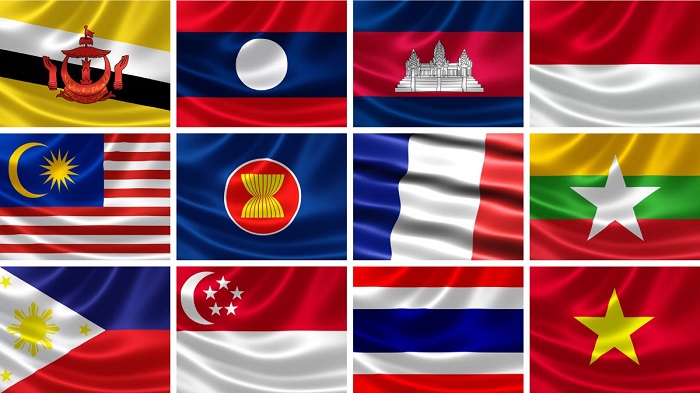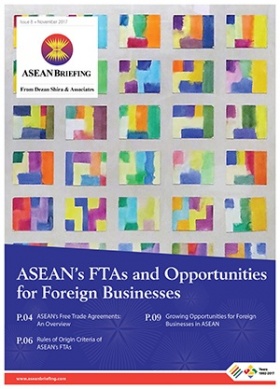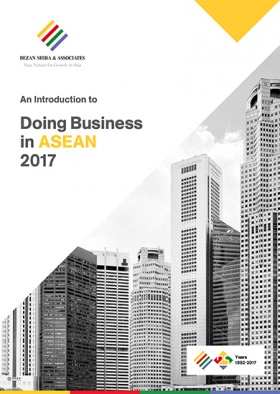French FDI in ASEAN Part II: Thailand, Philippines and Indonesia
By: Linh Tran Huy
Editor: Thibaut Minot
In the first part of this two-part article, we discussed France’s investments in Singapore, Malaysia and Vietnam. Reiterating the continued importance of the Association of Southeast Asian Nations (ASEAN) as a FDI destination for European investors, we look at French FDI in Thailand, Philippines and Indonesia in this concluding part.
![]() RELATED: Pre-Investment and Market Entry Advisory from Dezan Shira & Associates
RELATED: Pre-Investment and Market Entry Advisory from Dezan Shira & Associates
Thailand: from manufacturing to innovation
Thailand has long been regarded as an attractive investment destination. Its popularity has only increased further in recent years thanks to numerous government incentive policies, clear regulations and infrastructure development efforts. In 2016, FDI inflows totaled THB 358.11 billion, with a total of 925 projects, a slightly lower performance than in 2015 but still solid. France has strong economic relations with Thailand, with investments totaling EUR 4 billion in 2014 (an increase of 250 percent compared to 2006) and exports of EUR 1 745 million in 2016, i.e. 11.8 percent of the total investments of France in ASEAN the same year. The most popular import sector is electrical and electronic products, which account for 38.9 percent of Thai imports to France in 2016. Conversely, the most popular export sector is transportation services, supported by Airbus deliveries. In the eyes of many French investors, the maturity and economic fundamentals of the country make up for the political turmoil of recent years. As for the drop in imports of textile products (-30.7 percent compared to 2007), this is part of an overall trend of relocation of factories to countries with lower wages. In addition, the government’s new development initiative, also known as “Thailand 4.0”, aims to elevate the country to the rank of a high-income country through a true technological transformation.
Smart Thailand: new opportunities
The “Thailand 4.0” project seeks to galvanize 10 key industries (including digital, electronics, agro-food processing, robotics and tourism) through innovation. The buzzwords are: “smart manufacturing” and especially “smart farming”. Artificial intelligence, sensory technology and automation ensure more productivity and quality with fewer resources. One of the government’s priorities is to build “digital hubs” to accommodate SMEs. The US$ 283.8 million investment by the Ministry of Finance in the Science Park for the Food Innopolis initiative, for example, aims to make Thailand a hub of global agri-food innovation, with 9,000 food factories, 150 research laboratories, 3,000 researchers and 70 universities. Apart from the agri-food industry, we could mention the progress of the automotive industry (especially hybrid and electric), as well as the growth of SMEs in e-commerce.
There is, however, room for improvement when it comes to Thailand’s supply of human capital. Despite the remarkable investments in ICT (Information and Communication Technologies) and in the training of students, the Chinese electronics giant Huawei Technologies noticed in 2016 a lack of experts in computer science and digital understanding, especially in view of the country’s ambitions: a gap that could be filled by the expertise of foreign investors.
Study: French companies in Thailand
Thailand hosts about 350 French companies, including 200 SMEs and about 100 individual entrepreneurs. Eric Savettat, head of the economic service at the French Embassy, underlines the opportunities for French companies in urban planning (water, electricity, and signage) within the framework of project 4.0. He also mentioned opportunities in terms of scientific cooperation. It would be impossible not to mention multinationals such as Schneider Electric with its electronic, digital and energy modernization solutions, which, from last year, launched the “Light It Up” initiative aimed at electrifying less developed regions of the country with solar panels. Encouraged by this new vision of the Thai government, Valeo, a supplier of automotive parts and smart technologies, wants to strengthen its position, as evidenced by its recent acquisitions in the automotive industry such as the Ichikoh Group. The acquisition boosted its manufacturing power in Thailand and its expertise to respond to “technological changes”, not uncommon in the industry.
The country has also become a home for a large number of French technology startups. Kyklo, a cloud platform created by former Schneider executives to facilitate electromechanical e-commerce, is one example. The company, set up in 2015, has already won numerous awards.
Indonesia: a hidden consumption hub
The last diplomatic tour of François Hollande ended on March 29, 2017 in Indonesia, marking the first visit of a French head of state to the country since 1986. The goal for Paris was first and foremost economic in nature, with ties proposed to be boosted through a series of projects equivalent to EUR 3.21 billion with one of ASEAN’s largest economies. Indeed, Indonesia, with GDP growth of 5 percent in 2016, is particularly well-known for its emerging middle class and huge consumer potential. While FDIs only accounted for 15 percent of GDP in 2000, they came to occupy almost 30 percent of GDP in 2014. French-Indonesian trade amounted to EUR 4.4 billion in 2016, an increase of 13 percent year-on-year, with exports from France to Indonesia amounting to EUR 2.44 billion and imports of EUR 1.55 billion. Despite obstacles, it would be wise not to underestimate the potential of the largest market in Southeast Asia.
Various industries
The two main sectors remain the mining and manufacturing sectors. Although a large number of manufacturing industries are dominated by local companies, foreign investment is particularly important in machinery and electronic products (FDI of US$ 3.9 billion in 2016, 2,185 projects) and in chemicals and pharmaceuticals (US$ 2.9 billion, 1,096 projects), according to the Indonesian Bureau of Investment Coordination (BKPM). In recent years, the food industry has particularly increased in FDI flows, amounting to US$ 2.1 billion, or US$ 3.7 billion if we include food crops and plantations.
A consumer market
With a population of 261.1 million people, Indonesia is the fourth most populous country in the world. Its middle class is experiencing the fastest growth in the region, with a GDP per capita of US$ 3,603 in 2016 compared to US$ 857 in 2005. Said consumer class is expected to increase by 60 percent by 2020, from 88 million to 141 million people according to a BCG report. Pascal Furth, head of the economic department at the French Embassy in Jakarta, describes the country as a “must-see market”.
In response, foreign investors in the retail trade have flocked in recent years, such as Sogo (Japan), Lotte (Korea) and Galeries Lafayette (France). At first glance, they have invested in the most developed urban agglomerations where infrastructure and standard of living complement each other, such as Jakarta or Surabaya. However, there is increasing investment from smaller companies in more remote areas, where there is less competition and where it is theoretically easier to build on. However, the country’s geography (the largest archipelago in the world with 17,500 islands) makes the task arduous.
Infrastructure and corruption: two problematic components
Indonesia ranks 91st out of 190 countries in the ranking of countries where it is easier to do business, according to the World Bank. The main issues are infrastructure, inefficient bureaucracy and level of corruption, according to the 2016-17 Global Competitiveness Report. The Indonesian road network is equivalent to 508 000 km, of which 287 926 km or 56.7 percent are often blocked or congested, with very few alternatives in terms of public transport or related roads. With regard to corruption, recent government efforts do not completely fill the lack of confidence in the private sector and can still hurt business. In the case of a joint venture and corruption of local partners, foreign companies themselves risk legal action and exclusion from financial institutions such as the Asian Development Bank.
A potential still little exploited
Several reports from McKinsey predict that Indonesia will become the seventh largest economy in 2030, ahead of Germany and the United Kingdom, with a consumer class of 160 million people and an urban population of 209 million. During the last presidential visit, the representative of a large French group in Jakarta spoke of “hidden nugget”: if the Jokowi administration continues in its reforms, French companies who braved the first pitfalls could be highly rewarded.
Study: French multinationals and SMEs aim at the middle class
The list is long: Carrefour, Danone, Aventis, Accor, France Telecom and many other French companies are targeting this growing consumer market. Danone has a monopoly on the supply of water bottles through the Aqua brand, producing more than 10 billion liters of water locally in 2015. The substantial marketing campaign carried out in the first half of 2017 has all the more contributed to its success in Indonesia, making Aqua the best-selling bottled water in the world. The development of the population has also led to improvements in the health system and consequently the construction of several hundred hospitals, clinics, medical equipment and medicines: Ceva, Essilor and Sanofi have been able to jump on the opportunity. At the beginning of the year, it modernized its production center in East Jakarta in order to become one of the most important pharmaceutical manufacturing hubs in the world, certainly with the aim of better covering the Indonesian population.
The Philippines: in the middle of the value chain
The Philippines posted GDP growth of 6.8 percent in 2016, surpassing China and Vietnam and following the line set by the Aquino administration. FDI also increased in 2016, reaching US$ 7.93 billion and surpassing the US$ 5.1 billion accumulated in 2015, representing a growth of 22.2 percent. Regarding the French-Philippine economic relations, these remain relatively modest; the Philippines accounted for 0.2 percent of imports to France and 5.5 percent of French sales in ASEAN in 2016. Trade in 2016 amounted to EUR 1.66 billion, down from previous years. However, several factors indicate a positive impact. First, FDI itself remains strong thanks to the recent establishment of large groups (Total, Essilor, Lafarge, L’Oréal to name a few). Secondly, Francois Hollande’s five-year period was marked by diplomatic visits aimed at strengthening trade relations between the two countries as well as the visibility of French multinationals for potential public-private partnerships (PPP). Finally, on the occasion of the 70th anniversary of diplomatic relations between the two countries, “Phil French”, an event intended to promote France in the Philippines throughout the year, has all the more multiplied the initiatives of high-tech entrepreneurship with the French Chamber of Commerce in the Philippines. Future prospects look good, with Rodrigo Duterte’s 10-point economic program focused on goals such as improving the business environment, developing rural areas, investing in human capital, and implementing tax reforms that would benefit FDI.
IT services: pillar of the economy and investments
The Philippines is one of the world’s top offshoring destinations (with Manila and Cebu in 2nd and 7th places respectively) with a lower cost labor force but with a high level of education and very good English proficiency. One can observe the many investments in ICT (70 percent of whose revenues come from foreign structures): the call centers, computer processing, software development and multimedia content creation are numerous in the country, forming a total of 243 Parks or ICT Centers based on statistics from the Philippine Economic Zone Authority in October 2016. The Philippines surpassed India in 2011 to become the undisputed leader in Business Process Outsourcing (BPO) and are now targeting the podium of Knowledge Process Outsourcing (KPO), a sector that is only growing.
The manufacturing sector: an identity crisis in the value chain?
FDI inputs to the Philippines in terms of manufacturing remain below those of its ASEAN neighbors. The growth of the manufacturing sector, and in particular of electronic products (the main Philippine exports) in the 2000-2011 period, pale against the Vietnamese miracle (1.9 percent compared to 25.5 percent). Although an exporter of high added-value products, assembly is in itself a basic task that does not require a particularly skilled workforce, which encourages investors to look for even cheaper destinations such as Indonesia or Vietnam. On the other hand, the high level of education and the environment do not seem to be enough for investors seeking to deliver even more sophisticated and innovative products and services that will find their salvation in Singapore. This unfavorable reality is well illustrated by the OECD’s 2015 Global Value Chain Participation Index, where the Philippines is right in the middle, in other words too expensive for low value-added manufacturing but perhaps not attractive enough for the production of very high-tech services, which raises questions with regards to the country’s comparative advantage.
Finding your identity: opportunities for foreign investors
Yet the Philippines is not lacking assets. Its main advantage is its relatively skilled workforce with a strong command of English, ideal for products and services with a certain added value. Foreign investors who choose the Philippines are targeting specialized niche markets that require a certain level of skill and technology. The Filipino Investment Bureau, seeking to overcome the competitive wall, presented this year a list of sectors in which FDI is encouraged through various incentives: agri-food processing and household appliances in the manufacturing sector; exploitation of alternative and renewable energy sources and the fight against global warming, as well as the installation of research and development centers and incubators as engines of innovation.
Study: French companies in various sectors
Teleperformance is one of the first customer service outsourcing companies to be established in the Philippines in the 1990s. Today, the French group is the world leader in its field. Many leading companies want to outsource their call centers in the country. In other service-related areas, one of the best-known examples would be Alcatel-Lucent, which in recent years has worked extensively with Globe Telecom to install 4G in the country. Finally, we could mention the recent case of Alstom and Bouygues, which, through an agreement of EUR 450 million with the Metro Pacific Investment Corporation, are currently working on the extension and maintenance of Line 1 of Metro Manila and aim 2020 as the deadline for completion. SMEs are not left out: Sabella, an SME headquarters out of the Brittany region of France, is expected to complete the construction of the country’s (and ASEAN’s) first tidal farm in 2019. France has particularly valued expertise in terms of infrastructure modernization.
 RELATED: ASEAN’s Free Trade Agreements: An Overview
RELATED: ASEAN’s Free Trade Agreements: An Overview
Conclusion: ASEAN, a promising future
The moment seems propitious for French investors interested in ASEAN, for two main reasons. The first is China’s declining competitiveness in some aspects. High wages and the fading of certain preferential regulations push some companies to adopt a “China + 1” model, relocating their production centers in ASEAN while keeping a base in the Middle Kingdom for high added value manufacturing. The second reason is the growing attractiveness of these countries, both for their wages and for their middle classes and industrial clusters. Other factors, such as the failure of the TPP and Brexit, strengthen France’s position vis-à-vis its partners. If current economic agreements permit, France may soon become the main engine of EU-ASEAN relations.
About Us
ASEAN Briefing is produced by Dezan Shira & Associates. The firm assists foreign investors throughout Asia and maintains offices throughout ASEAN, including in Singapore, Hanoi, Ho Chi Minh City and Jakarta. Please contact us at asia@dezshira.com or visit our website at www.dezshira.com.
- Previous Article Myanmar’s Investment Outlook for 2018
- Next Article La zone de libre-échange numérique de la Malaisie











